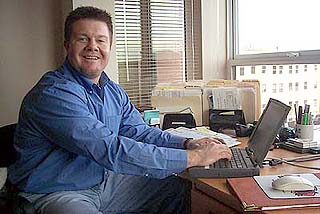January 10, 2000
Developers trying to 'future-proof' housing
Journal Staff reporter
To succeed in the business world, Mark Dyce needs to make a big impression.
"As a small business person, one of the things that's important to me is the perception of being a larger company than I am," he said. "It's important to have the resources to be as efficient and productive as possible."
One of the most indispensable resources for Dyce is high-speed Internet access. A principal with Kavacom, a sports and entertainment marketing firm, Dyce relies on the Internet to draw new clients. "Most of my work is done online," he said.

|
As a marketing tool, high-tech features in apartments and condos is emerging as the new standard in the Seattle area, where the tech workforce is rapidly expanding. The Athena's brochure touts "panoramic vistas," but places as much emphasis on the fact that it's "Built for the 21st century."
"Most of the people we are leasing apartments to are in the high-tech industry," said Dora Carelli, sales and marketing director for Pryde Corp., which developed the Athena. "They're just running their lives with computers."
The Athena offers high-speed Internet through US West or AT&T, as well as a business conference center. "With access to the conference room, I can operate as a legitimate small business," Dyce said.
"Most of the people ask about the ability to telecommute out of the apartments," said Curt Pryde, president of Pryde Corp. "So many more people are able to work from their apartments if they have Internet access. That's become the standard now."
At the recently opened Concord, an upscale condo complex in Belltown, high-tech features abound. Dean Jones, vice president of T. Jones, which developed the twin-tower Concord, said high-speed Internet capability is a must for many residents.
"We analyzed the market and realized that a lot of one- and two-bedrooms were being used as home offices," he said. "I just don't think any condo or apartment should be without high-speed Internet activity."
The Concord also offers an Intranet system that allows residents to electronically communicate with the concierge and maintenance staff, as well as a "smart box distribution panel," allowing residents to link several computers within each unit. The Concord's business center offers a scanner and video-conferencing.
"There are two types of communities -- wired and non-wired," Jones said, noting that the Concord is a finalist in the National Homebuilders Association's Community of the Year category. The winner will be announced mid-January.
But if being wired for high-speed Internet is all the rage among new buildings, where does that leave older buildings?
While buildings like the Concord and Athena stress their Internet access capability, residents of most older buildings can still access high-speed Internet through US West's DSL service, or through cable TV with AT&T.
But instead of going with US West or AT&T, Jones opted to use a microwave signal system when it came time to retrofit the Elektra on First Hill for its conversion from apartments to condos. Jones tapped the Seattle company ReFlex Communications for the job of fitting the Elektra with high-speed Internet.
"We come in and provide a third network -- we aren't dependent on the cable company or the phone company," said Dave Cable, ReFlex's general manager for Seattle. ReFlex employs microwave technology to send Internet signals to antennas atop residential buildings, then routes the signals through the building's phone lines and into units.
Cable said the service is as fast as DSL and cable Internet, and is scalable -- meaning his company can increase bandwidth as technology improves. Bandwidth-hungry Web sites will require greater speeds in the future.
In addition to the Elektra, ReFlex has installed systems in Belltown Court, Continental Plaza and First Hill Plaza. The ReFlex system allows each building to create its own wired community.
Residents' need for faster and faster Internet service is propelling business for the company, Cable said, noting it is expanding services quickly in Seattle and will move into other western cities.
From a building owner's perspective, high-speed Internet is a wise investment, Cable said. "We have a lot of property owners who realize the fact that high-speed Internet connection immensely increases the value of the property and attracts a higher demographic to the building itself."
ReFlex's fiber-optic quality Internet feeds have also been a hit with Harbor Properties, which plans to use the system in its Harbor Steps apartments on First Avenue downtown. Stephen Fina, director of marketing for Harbor Properties, said "affluent and technically sophisticated people" are making good use of the system.
"We expect home offices to be a big part of the future," he said.
Monte Harris, a real estate broker with Windermere, said high-speed Internet is a common request among his downtown condo clients.
"It's something that's on everybody's mind," he said. Harris said he recently sold a $500,000 condo to a man who said he would purchase only on the condition that he could receive DSL service. The client writes a hedge fund newsletter and depends heavily on high-speed Internet.
"It makes everyone's life easier," Harris said. "You can reserve the meeting room without picking up the phone, have a party catered or get your drycleaning done. It makes it into a five-star hotel to be able to do that in a key stroke."
Jones said high-tech buildings are no fad. "Everything in the future looks to hang off technology," he said. "It's a staple. It will become like having hot and cold water in the future."
